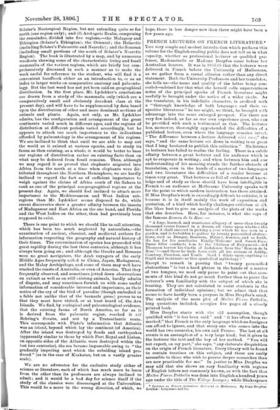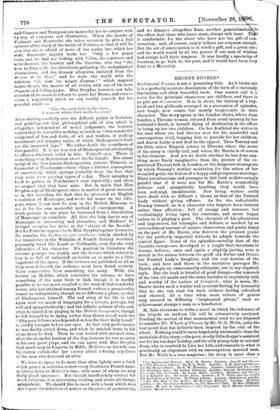FRENCH LECTURES ON FRENCH LITERATURE.*
THE very simple and modest introduction which prefaces this volume for the English-reading public does not tell us in what capacity, whether as professional lecturer or qualified pro- fessor, Mademoiselle or Mademe Dreyfus came before her Australian hearers. It was in 1893-95 that the lectures were delivered in French before the University of Melbourne,
as we gather from a casual allusion rather than any direct statement. Both the University Professors and her translator, she tells us—the name and quality of the latter being con- cealed—advised her that what she herself calla unpretentious notes of the principal epochs of French literature might usefully be brought under the notice of a wider chele. As the translator, in his indefinite character, is credited with a "thorough knowledge of both languages and their re- spective literatures" he too might, we think, be brought with advantage into the same enlarged prospect. For there are very few indeed, as far as our own experience goes, who can be provided with such a testimonial as that. The lectorer has, moreover, thoroughly apprehended the difficulties of a published lecture, even where the language remains intact.
"The difference between a lecture delivered yithi yore," she says, "and the same lecture set down in writing is so great that I long hesitated to publish this collection." No listener to lectures has failed to realise the feeling. There is a subtle affinity between a great lecturer and his audience which is apt to evaporate in writing ; and when between him and our understanding of his meaning stands the further obstacle of translation, even in the hands of a master of two languages and two literatures the difficulties of a reader become at
times very great. That lectures so full of evidences of know- ledge and of study as these should have been intelligible in French to an audience at Melbourne University speaks well for the point to which modern instruction has there attained. If Miss Dreyfus's work is exceedingly difficult to criticise, it is because it is in itself mainly the work of exposition and
quotation, of a kind which hardly challenges criticism at all. She likes best to give an analysis of the plots of the works that she describes. Here, for instance, is what she says of the famous Rowan de la Rose :— "A long, learned, and wearisome allegory of more than twenty thousand verses framed in a dream, all turns upon whether the hero of it shall succeed in picking a rose which he has seen in a garden, and is forbidden to gather by twenty personified abstrac- tions, such as Danger, Baseness, Hatred, Avarice, and so forth. He has for his auxiliaries Kindly-Welcome and Sweet-Face. Dame Idler conducts him to the Chateau of Enjoyment—did Thomson borrow his Castle of Indolence from the 'Roman de la Rose' ?—and there he finds Love with all his retinue of Jollity, Courtesy, Freedom, and Youth. Need I dilate upon anything so frigid and inanimate as this symbolical mythology P"
Except to remark in passing that "twenty personified abstractions" is but a hard phrase in the hands of a master of two tongues, we need only pause to point out that com-
ments of this kind do not go much further than to prove the lecturer's own familiarity with the subject of which she is treating. They are not calculated to assist students in the formation of individual opinions ; but we admit that that seems to have hardly been a purpose in Miss Dreyfus's mind. The analysis of the mere plot of Maitre Pierre Pathelin, long quotations included, occupies five pages of a closely printed book.
Miss Dreyfus starts with the old assumption, though
qualified with "it has been said" and 'it has often been re- marked," that French is the only language which no foreigner can afford to ignore, and that every one who comes into the world has two countries, his own and France. The last at all
events is an assumption of a very large kind ; but it gives to the lecturer the text and the key of her method. "You will not expect, on my part," she says, "any elaborate disquisition on the origin of French literature. Every library will be found to contain treatises on this subject, and these are easily accessible to those who wish to pursue deeper researches than are now practicable for me." In justice to Miss Dreyfus we may add that she shows an easy familiarity with regions of English letters not commonly known, as with the fact that
Maitre Pierre Pat helm was done into English a hundred years ago under the title of The Village Lawyer ; while Shakespeare • net Literature Delizered in Melbourne. By Irma Dreyfus. This would be a move in the wrong direction, of which, we eont:7fInoemn Pse"s and Co. and Chaucer and Tennyson are names for her to conjure with by way of comment and illustration. When she speaks of Froissart and Monstrelet she takes occasion to give a fall epitome of the story of the battle of Poitiers, so that it will be seen that she is afraid of none of the paths into which her wide, discursive inquiry leads her. Only a few pages later, and we find her trifling with Villon, the roysterer and ne'er-do-weel, the brawler and the libertine, who was "the first to fling aside the chivalrous gallantry, the metaphysical abstractions, and the dreamy allegories imitated from the Roman dc la ROSC," and to wake the world with the delicious "oh sont les neiges d'antan ? " which inspired Sainte-Beuve, the master of all critics, with one of his most etoquent and telling pages. Miss Dreyfus, however, can take occasion of its musical refrain to quote her Burns, and even to claim a superiority which we can hardly concede for his graceful simile :— "Like the snow-falls in the river,
A moment white, then melts for ever."
After skating carefully over the difficult points in Rabelais, and pointing out that philosophical side of him which is altogether independent of moral judgments, the lecturer argues that be resembles nothing so much as "that wonderful compound of fun and frolic, of wit and wisdom, of madcap merriment and stinging satire, of which Shakespeare's fools are the immortal type." We rather doubt the soundness of this parallel. It is no true test of Shakespearian scholarship to affect a wholesale belief in him. Falstaff—yes. There is something very Rabelaisian about the fat knight. But about -many of the best-known Shakespearian jesters—Trinculo or Launcelot or Touchstone—there clings a distinct atmosphere of uncertainty, which springs probably from the fact that they were mere passing types of a day. Their meaning is bard to gather, in Touchstone's case especially; and often we suspect that they have none. But in much that Miss Dreyfus says of Shakespeare there is matter of great interest, as in her recording the fact that he procured an English translation of Montaigne, and wrote his name on the title- page, where it can now be seen in the British Museum, to use it for his own masterful method of conveyancing. A ivhole passage in one place he borrowed from a dissertation of Montaigne on cannibals. All that the lady has to say of Montaigne is interesting and attractive, and Madame de Sevign6 occupies her niche as the "classic of the fireside." But La Fontaine appears to be Miss Dreyfus's prime favourite. He remains the bonhomme par excellence (wisely shirked by tho translator) in the Walhalla of French literary worthies, personally loved like Lamb or Goldsmith, even for the very infirmities of his character. His position in literature she esteems perhaps too highly, and the lecture which relates to him is so full of unlimited quotation as to make us a little impatient of the space. If the lectures are published at all as they were delivered, the audience must have found seventy- three consecutive lines something too many. With the Lecture on Moliere, which concludes the volume, we have something of the same fault to find, though it is hardly possible to be too much recalled to the work of that wonderful writer, who has attained among French writers a premiership almost as indisputable, though on so different a plane, as that of Shakespeare himself. The sad story of his life is told again with too much of biography for a lecture, perhaps, but well and sympathetically ; and the infinite sadness of the end, when he insisted on playing in the lifalade Imagin,aire, though he felt himself to be dying, rather than throw out of work the "fifty poor fellows who depended on him for their daily bread," is vividly brought before our eyes. At that very performance he was finally struck down, and when he reached home in his stage-dress be died. Then he was buried with maimed rites, after the shameful fashion of the day, because be was an actor in his own great plays, and we can agree with Miss Dreyfus that much may be forgiven to Mdlle. Moliere—as his wife was by custom called—for her outcry about refusing sepulture to the man who deserved an altar.
We have no space to do more than skim lightly over a book which passes in sedulous review every illustrious French name in fetters down to tioliere's time, with some of whom we may fairly plead ignorance. But though insufficiently critical for much criticism, it is interesting reading, and above all things, sympathetic. We should like to meet with a book which does not repeat the definition of genius as the power of painstaking, and we disagree altogether from another generalisation, to the effect that those who know most, always talk least. T is comfortable for the silent who have not the gift of con- versation; and, of course, empty talkers are common enough. But the art of conversation is in itself a gift, and a great one; and the world would be all the poorer if our men of wisdom had always held their tongues. It was hardly a speciality. of Socrates, to go back to the.past, and it would have been very fatal to a Macaulay.











































 Previous page
Previous page